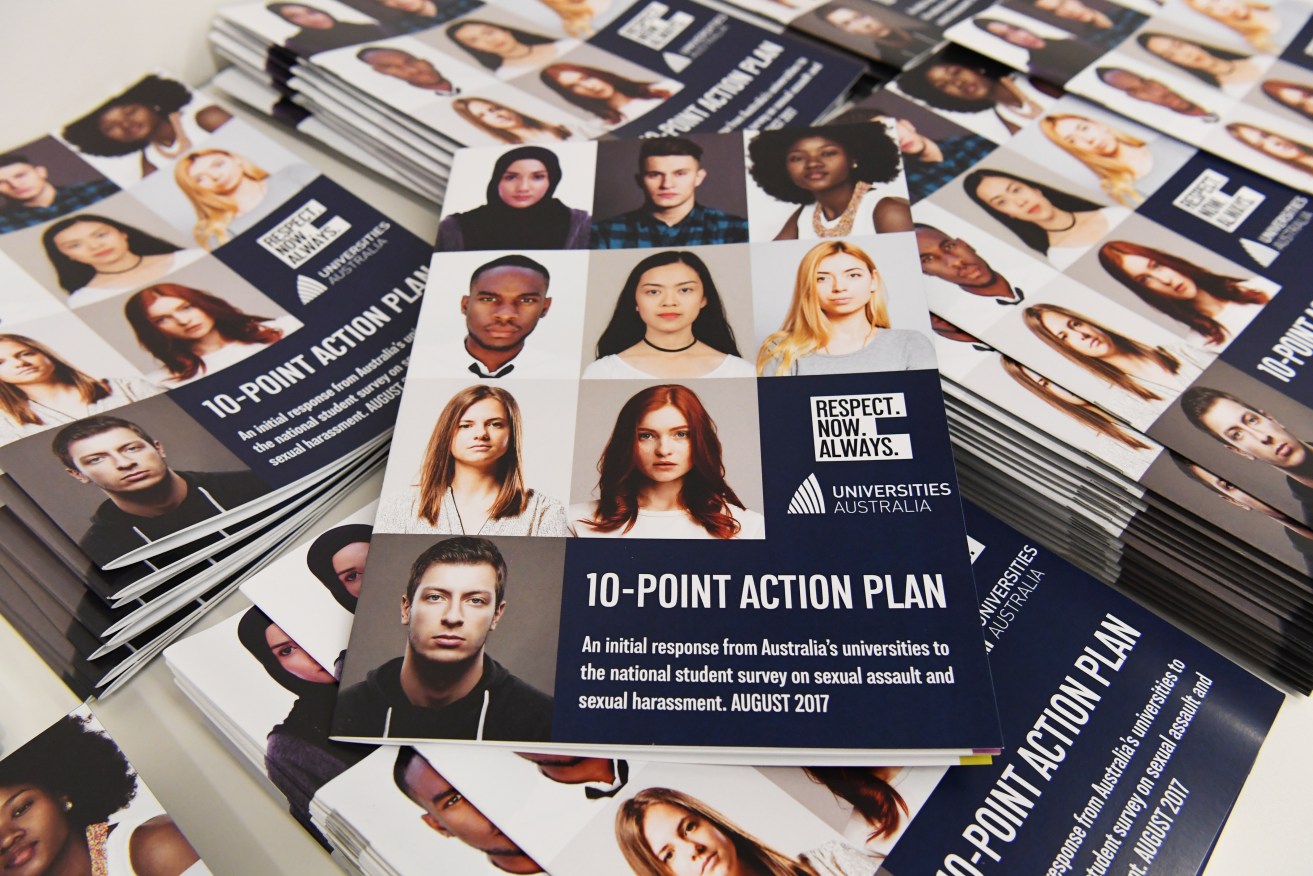Uni sex assault survey: SA institutions react to their data
South Australian universities have revealed the rate of sexual assault and harassment at their institutions, as measured by the Australian Human Rights Commission’s survey of more than 30,000 university students across the country.


The universities' initial plan to respond to the survey. Photo: AAP/David Moir
The figures are roughly in line with the disturbing national results, with a few exceptions.
Sexually harassed at university in 2016
The national figures showed 26 per cent of students reported being sexually harassed at university last year, including on public transport travelling to and from university. The most common forms of harassment were inappropriate staring or leering (14%), sexually suggestive comments or jokes (11%), and intrusive questions about an individual’s private life or physical appearance (9%).
For Flinders University this figure was 23 per cent; for UniSA students it was 24 per cent; and for University of Adelaide students it was 28 per cent.
Nationally, 22 per cent of students who reported harassment said it occurred on public transport going to and from university.
Flinders students were significantly out of step with the national figures, with only 9 per cent reporting harassment on public transport. UniSA and Adelaide students reported public transport harassment roughly in line with the national statistics (24 per cent and 23 per cent, respectively).
Nationally, 7 per cent of students who reported harassment said the perpetrator was a tutor or lecturer. At Flinders this figure was way above the national average – 25 per cent. At UniSA this figure was 6 per cent; and at Adelaide it was 8 per cent.
Flinders described the reports of staff harassment as “deeply concerning”. While the survey doesn’t indicate how many staff had been involved, Flinders students and staff had made six formal reports of harassment that involved staff in the past year.
“We have investigated and acted,” the university said in a statement. “The various actions taken include giving counselling, warning the staff member, removal from management roles, and suspension. One suspended staff member has resigned. Amongst the respect and safety initiatives we have undertaken, improving information and training for staff continues to be a priority. We will listen, we will investigate, and we will take action where necessary.”
Sexually assaulted at university in 2015 and/or 2016
Nationally, 1.6 per cent of respondents reported being sexually assaulted at university in 2015 and/or 2016.
UniSA had a higher rate than the national average – 3 per cent. Flinders was well under the national average at 0.2 per cent, as was Adelaide with a figure of 0.8 per cent.
UniSA Vice-Chancellor Professor David Lloyd said that data across institutions was not directly comparable.
“Within that context we are of course concerned about UniSA’s numbers around sexual assault recorded in the survey and wish to understand this data better because it does not reflect our own recorded reporting of such incidents,” he said. “Given that, we have asked the Commission to provide more information and we are also going to consult with our student representative bodies to unpack what this might mean for our students.”
University responses
All three local universities expressed deep concern about the survey results and pledged “zero tolerance” for sexual harassment and assault.
The University of Adelaide promised to adopt all of the recommendations in the Human Rights Commission report, and expressed determination to “dramatically reduce” the incidence of sexual harassment and assault.
“It is of course deeply concerning that one in five of our students responding to the survey experienced sexual harassment at university (excluding public transport),” said interim Vice-Chancellor Professor Mike Brooks.
The university has started implementing an action plan, including consent training for staff and students, additional counselling services and a dedicated phone line for reporting incidents.
Flinders University pledged to adopt the recommendations from the peak body, Universities Australia, on best practice in the field.
Vice-Chancellor Professor Colin Stirling said the survey identified levels of sexual harassment that were unacceptable.
“These findings are of grave concern to me personally and I am committed to ensuring that we redouble our efforts to provide a safe and respectful environment for work and study for everyone at Flinders University,” he said.
Flinders promised to provide increased staff training and improve access to support services. It had recently made consent training available as an online package.
The University of South Australia said it had a long-term, integrated safety and well-being approach designed to protect students from sexual assault and harassment. It would review the survey data to see where its approach could be improved.
It also promised to adopt all of the recommendations of the national report.
“We want to be champions for change in this space and that starts right here on campus with our own students,” said Vice-Chancellor Professor David Lloyd. “Our goal now is to do more to assess and improve the psycho-social safety of our campuses for all our students and staff.”
Each university has published its individual survey statistics on its website.




